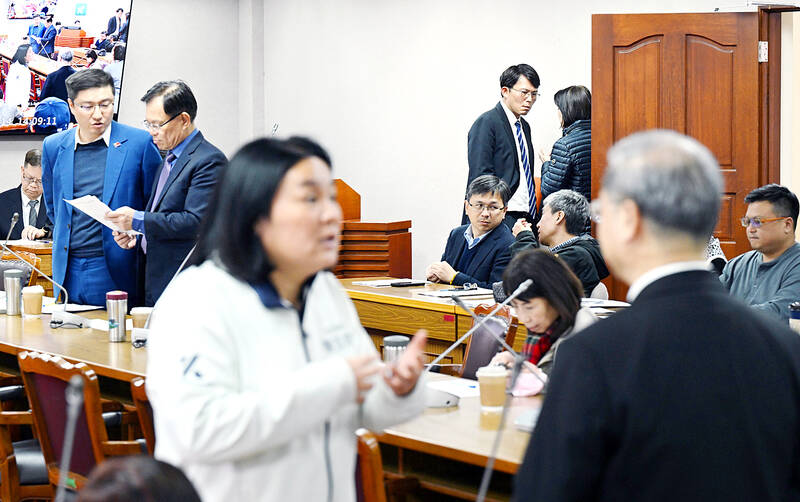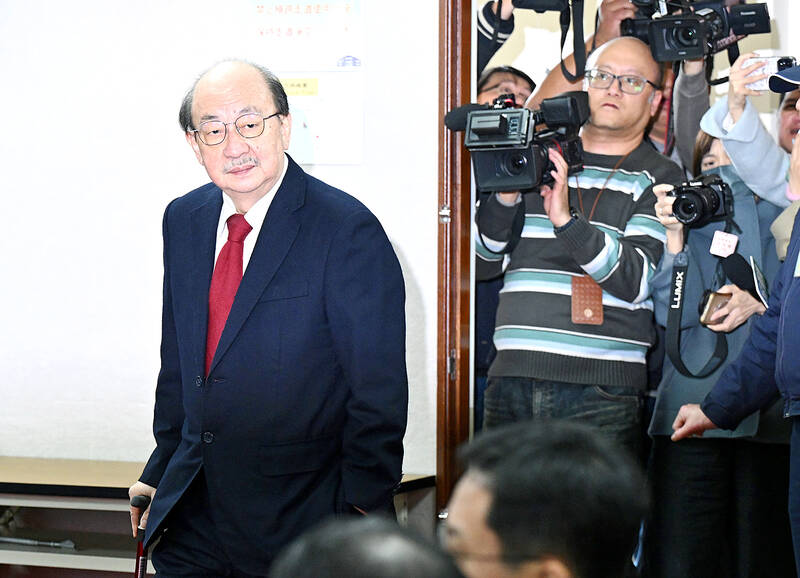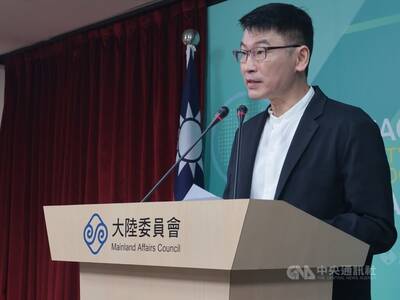No consensus was reached in yesterday’s cross-party discussions regarding the general budget for this year, while Legislative Speaker Han Kuo-yu (韓國瑜) said the reduced budget would be sent to the Cabinet today.
Han convened a meeting among legislators and representatives from the Executive Yuan to try to break a deadlock over budget cuts and freezes.
As no agreement was reached, Han expressed his hope that the Executive Yuan would not ask the Legislative Yuan to reconsider the budget, given that lawmakers have approved its third reading.

Photo: Liao Chen-huei, Taipei Times
After the meeting, Han called the lack of resolution “bitter medicine” for all participants, but added that there are still viable paths to a solution.
If the Executive Yuan does not request that lawmakers reconsider the budget, each caucus could discuss follow-up plans and legislative committees could work to unfreeze parts of the budget after their chairs are elected next month, Han said.
He also expressed his respect for whatever decision the Executive Yuan makes, adding that he would be open to proposals for additional funding, if they are deemed necessary, or resorting to Article 22 of the Budget Act (預算法), which allows government agencies to use reserve funds.

Photo: Liao Chen-huei, Taipei Times
Democratic Progressive Party caucus whip Ker Chien-ming (柯建銘) asked when the budget would be sent, with Han saying it would happen today.
The budget being sent out allows for subsequent constitutional actions, such as whether the Executive Yuan needs to request reconsideration, Ker said.
Chinese Nationalist Party (KMT) caucus deputy secretary-general Wang Hung-wei (王鴻薇) took issue with the Executive Yuan calling the budget freeze the largest in history, saying it was an “unforgivably large” error.
NT$138.1 billion (US$4.21 billion), or 4.6 percent of the total budget, has been frozen, but in 2006, it was 13.24 percent, she said.
Although utilizing reserve budgets is part of the Executive Yuan’s mandate, the Budget Act stipulates that they cannot be used for items that the legislature has removed, while expenditures greater than NT$50 million are subject to prior filing with the Legislative Yuan, Wang said.
The Executive Yuan’s temporary funding would give the government a “blank check,” she said.
Han made his best effort in negotiating with the Executive Yuan, Taiwan People’s Party Chairman Huang Kuo-chang (黃國昌) said.
Huang accused the Executive Yuan of taking an “absurd” approach to the budget issue by failing to negotiate in good faith and not preparing proposals appropriately.
“I hope the Executive Yuan and Premier Cho Jung-tai (卓榮泰) will reflect on their handling of the budget and their attitude toward the Legislative Yuan,” he said.

ENDORSING TAIWAN: Honduran presidential candidate Nasry Afura said that Honduras was ‘100 times better off’ when it was allied with Taipei The Ministry of Foreign Affairs yesterday said it would explore the possibility of restoring diplomatic relations with Honduras based on the principle of maintaining national interests and dignity. The ministry made the remarks in response to reporters’ questions regarding an article titled: “Will Taiwan Regain a Diplomatic Ally?” published in The Diplomat on Saturday. The article said Honduras’ presidential election in November could offer Taiwan the chance to regain an ally, as multiple candidates have promoted re-establishing diplomatic relations with Taiwan. Honduras severed diplomatic ties with Taiwan in March 2023 in favor of Beijing, but since switching its diplomatic recognition,

A fourth public debate was held today about restarting the recently decommissioned Ma-anshan Nuclear Power Plant, ahead of a referendum on the controversial issue to be held in less than two weeks. A referendum on Aug. 23 is to ask voters if they agree that “the Ma-anshan Nuclear Power Plant should continue operations upon approval by the competent authority and confirmation that there are no safety concerns.” Anyone over 18 years of age can vote in the referendum. The vote comes just three months after its final reactor shut down, officially making Taiwan nuclear-free. Taiwan People’s Party Chairman Huang Kuo-chang (黃國昌) represented

Scoot announced yesterday that starting in October, it would increase flights between Taipei and Japan’s Narita airport and Hokkaido, and between Singapore and Taipei. The low-cost airline, a subsidiary of Singapore Airlines, also said it would launch flights to Chiang Rai in Thailand, Okinawa and Tokyo’s Haneda airport between December and March next year. Flights between Singapore and Chiang Rai would begin on Jan. 1, with five flights per week operated by an Embraer E190-E2 aircraft, Scoot said. Flights between Singapore and Okinawa would begin on Dec. 15, with three flights per week operated by Airbus A320 aircraft, the airline said. Services between Singapore

The Mainland Affairs Council (MAC) yesterday announced a ban on all current and former government officials from traveling to China to attend a military parade on Sept. 3, which Beijing is to hold to mark the 80th anniversary of the end of the Second Sino-Japanese War. "This year marks the 80th anniversary of the end of World War II and the Republic of China’s victory in the War of Resistance [Against Japan]," MAC Deputy Minister and spokesperson Liang Wen-chieh (梁文傑) told a regular news briefing in Taipei. To prevent Beijing from using the Sept. 3 military parade and related events for "united